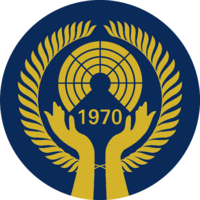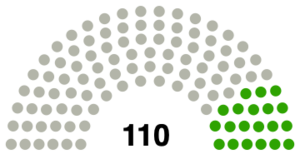Union Assembly: Difference between revisions
mNo edit summary |
mNo edit summary |
||
| (8 intermediate revisions by the same user not shown) | |||
| Line 7: | Line 7: | ||
|coa_res = 200px | |coa_res = 200px | ||
|session_room = | |session_room = | ||
|house_type = Unicameral | |house_type = Unicameral legislature | ||
|body = Union of Zomia | |body = Union of Zomia | ||
|leader1_type = Chairman | |leader1_type = Chairman | ||
| Line 25: | Line 25: | ||
|website = }} | |website = }} | ||
The '''Union Assembly''' is a quasi-parliamentary consultative body, consisting of twenty hereditary chieftains representing the autonomous tribal regions, and ninety directly elected councillors; ten from each of the princely states. Constitutionally, the Assembly is the unicameral legislature of the [[Union of Zomia]], directly elected by universal suffrage, though in practice its independence from the [[Executive Council]] is limited, as all candidates must be nominated by their | The '''Union Assembly''' is a quasi-parliamentary consultative body, consisting of twenty hereditary chieftains representing the autonomous tribal regions, and ninety directly elected councillors; ten from each of the princely states. Constitutionally, the Assembly is the unicameral legislature of the [[Union of Zomia]], directly elected by universal suffrage, though in practice its independence from the [[Executive Council]] is limited, as all candidates must be nominated by their State Election Committee, controlled in practice by their presiding prince. According to the [[International Council for Democracy]] "the process of nomination is opaque and voter intimidation is rife". Turnout is mandatory in seven of the nine princely states, and Zomi elections have been described by human rights groups as unofficial censuses, intended to enforce conscription and unfree labour obligations on Zomia's semi-nomadic {{wp|Shifting cultivation|swiddening}} population. | ||
The first election to the Union Assembly took place in 2002, and was marked by a wave of violent unrest across the country when district officials in the {{wp|Khmu People|Ryo}} and {{wp|Wa People|Chauchua}} Autonomous Territories attempted to hold their own regional elections in protest. Since the 2002 election, no political party has held seats in the Assembly. Prince President [[Paramountcy|Hpkeng III Sah Ngwegu]], who came to power in the [[2005 Zomi coup d'état]], declared Zomia a {{wp|non-partisan democracy}} and outlawed political parties, ostensibly as an 'anti-corruption and anti-factionalism measure'. In the 2007 election the Assembly elected [[Ung Yat Thwe]], a Colonel in the [[Union Defence Force]] and brother-in-law of Hpkeng III, as Chairman. In 2016 the Executive Council made a constitutional amendment extending the Chairman's term limit, and Ung Yat Thwe is expected to retain his position in 2022. | |||
Latest revision as of 12:12, 22 December 2021
This article is incomplete because it is pending further input from participants, or it is a work-in-progress by one author. Please comment on this article's talk page to share your input, comments and questions. Note: To contribute to this article, you may need to seek help from the author(s) of this page. |
Union Assembly | |
|---|---|
 | |
| Type | |
| Type | Unicameral legislature of the Union of Zomia |
| Leadership | |
Chairman | |
| Structure | |
| Seats | 110 |
 | |
Political groups | Government (335)
|
Length of term | 5 years |
| Elections | |
| Single non-transferable vote for ruler-nominated candidates | |
Last election | 17th March 2017 |
Next election | 17th March 2022 |
The Union Assembly is a quasi-parliamentary consultative body, consisting of twenty hereditary chieftains representing the autonomous tribal regions, and ninety directly elected councillors; ten from each of the princely states. Constitutionally, the Assembly is the unicameral legislature of the Union of Zomia, directly elected by universal suffrage, though in practice its independence from the Executive Council is limited, as all candidates must be nominated by their State Election Committee, controlled in practice by their presiding prince. According to the International Council for Democracy "the process of nomination is opaque and voter intimidation is rife". Turnout is mandatory in seven of the nine princely states, and Zomi elections have been described by human rights groups as unofficial censuses, intended to enforce conscription and unfree labour obligations on Zomia's semi-nomadic swiddening population.
The first election to the Union Assembly took place in 2002, and was marked by a wave of violent unrest across the country when district officials in the Ryo and Chauchua Autonomous Territories attempted to hold their own regional elections in protest. Since the 2002 election, no political party has held seats in the Assembly. Prince President Hpkeng III Sah Ngwegu, who came to power in the 2005 Zomi coup d'état, declared Zomia a non-partisan democracy and outlawed political parties, ostensibly as an 'anti-corruption and anti-factionalism measure'. In the 2007 election the Assembly elected Ung Yat Thwe, a Colonel in the Union Defence Force and brother-in-law of Hpkeng III, as Chairman. In 2016 the Executive Council made a constitutional amendment extending the Chairman's term limit, and Ung Yat Thwe is expected to retain his position in 2022.